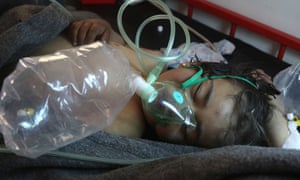The suspected nerve agent attack on a rebel-held area on Tuesday has underlined the regime’s confidence – bolstered by the Trump administration
Link

Heartbreaking images of desperate patients and dead children in Syria are, sadly, too familiar. But Tuesday’s attack in rebel-held Idlib province has forced a reaction: it is one of the worst suspected chemical attacks in the six-year war. It claimed at least 67 lives, and the symptoms suggest the use of a nerve agent, probably sarin. It hit an area where thousands had taken shelter from fighting nearby. It was followed by attacks on medical facilities treating victims. It had “all the hallmarks of a regime attack”, said Britain’s ambassador to the United Nations. The White House accused the Syrian government of a “heinous” attack.
Damascus denies using chemical weapons, and ascertaining the agents used, by whom, is always difficult – particularly given the problems experts will face in accessing the site. Nonetheless, the evidence so far points in one direction, not least because sarin is not easy to produce. In 2013, under threat of US strikes after sarin gas killed up to 1,300 in Ghouta, a besieged district in Damascus, Bashar al-Assad agreed to eliminate his chemical weapons stores . But a UN security council report warned last year that the regime had continued to carry out chlorine attacks on civilians (Islamic State had also used sulphur-mustard gas). Human Rights Watch has documented 24 chlorine attacks in Syria since 2014, including systematic use in Aleppo. The suspicion is that Tuesday’s strike, like another suspected sarin attack which killed 93 people in eastern Hama in December, is retaliation by an increasingly confident regime for the military pressure it has faced in the area: having pushed back, it wanted payback – at the cost of civilians.
Some have already drawn a link between what seems to be the use of a more deadly agent and the US shift on Syria. The secretary of state said last week that Mr Assad’s future was a matter for the Syrian people, while the ambassador to the UN said removing him was no longer the priority (though she later tempered that remark).
Those comments dangerously reinforced, rather than created, the regime’s certainty that it can carry out war crimes with impunity. As a candidate, Donald Trump said Mr Assad’s future was “secondary” to defeating Isis. In February, Russia and China vetoed a security council resolution imposing sanctions over chemical weapons use; Wednesday’s meeting on the issue is unlikely to change much. Europe is deeply concerned, not least given the implications for its own security, and has reasserted that the future cannot involve Mr Assad – but its limitations are underscored by the fact the attack occurred hours before a two-day conference on Syria’s future, hosted by the UN and EU, began in Brussels. Peace talks have gone on for years; expectations are lower than ever.
The terrible effects of chemical weapons in the first world war were soon followed by measures to control them. More than 190 countries, including Syria, have signed the convention banning them. Now experts warn of the risk that their use is being normalised again. Part of the horror of Tuesday’s attack is that it has taken a high death toll and the suspected use of sarin to make the international community, apparently inured to chlorine attacks, react. If the culprits are not stopped, all efforts must be made to ensure they face justice eventually. If impunity proves to be permanent, a tragedy for the people of Syria may have catastrophic consequences for many others, too.

No comments:
Post a Comment